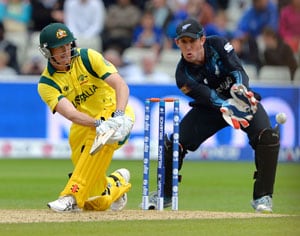Bailey and the rotation mocktail
The win allowed Australia to leave the United Kingdom with some consolation from an otherwise dismal tour. Clarke's words were understandable.
- Written by Saurabh Somani
- Updated: July 08, 2014 06:26 pm IST
 "To a lot of people this ODI series does not mean much, but to the Australia players it means a lot." That was Michael Clarke, after Australia's win in the fifth match of a rain-blighted ODI series against England.
"To a lot of people this ODI series does not mean much, but to the Australia players it means a lot." That was Michael Clarke, after Australia's win in the fifth match of a rain-blighted ODI series against England.
The win allowed Australia to leave the United Kingdom with some consolation from an otherwise dismal tour. Clarke's words were understandable.
A loss in the final ODI would have been doubly hard to bear for Australia after George Bailey had given them an excellent chance to seal the series in the fourth ODI at Cardiff itself.
While Shane Watson and Clarke will rightly get the plaudits for the eventual series win, Bailey was no less of a presence. His 82 off 67 in the second ODI was as vital as Clarke's century in the same match, and in the fourth ODI, he made 87 in an innings where no Australian batsman crossed 40. Equally impressive was that he batted for only 91 balls, a remarkable strike-rate, given Australia's eventual 227 all out in 48.2 overs, a total they nearly defended.
He didn't get a big score in the fifth ODI, but was in the thick of the action on the field, with a brilliant pick-up-and-throw to run Luke Wright out being the highlight. Wright ran a tad lazily, and a dive might have saved him, but the athleticism that Bailey showed in swooping down on the ball and throwing the stumps down in one fluid motion, deserved a wicket.
Off the field, Bailey showed calm and level-headedness, when he diffused the simmering controversy over Fawad Ahmed's non-sponsor-logo-bearing jersey. "I think he's probably had to deal with a lot more important things than what's on the front of his shirt," was Bailey's pithy comment.
Bailey might have allowed himself a quiet chuckle before the series, when England's ODI squad drew a chorus of protests, with Alastair Cook, Ian Bell, James Anderson, Stuart Broad and Graeme Swann rested. Michael Vaughan went as far as saying that fans who had paid for tickets ought to get a refund due to the rotation policy.
Not too long ago, Bailey had been at the centre of another rotation-based controversy, when Australia rested key players during an ODI series against Sri Lanka at the start of the year. Bailey suggested that Channel 9 played up Australia's lack of stars because of impending contract negations with Cricket Australia, and drew the ire of Brad McNamara, the former New South Wales allrounder and now a producer with Channel 9. McNamara had said at the time that Bailey could have been "flippin burgers at McDonald's" if it wasn't for the money television pumped into cricket.
McNamara's comments, discussed at length here, had more to do with the impact of television revenues on the sport, while Vaughan was speaking more about the ticket-paying fan at the stadium.
That big stars are far likelier to draw in bigger crowds - at the stadium and in front of television sets - is evident. It's not clear why that should be enough cause for them to play as often as possible though.
Broadcasters cannot or, at any rate, must not make selectorial demands. But what of the fan? The argument can be made that the game is what it is because of the fan, that television revenues are big because enough people want to watch cricket, and, ultimately, the players themselves become stars because of the fan. But that is ignoring what goes into the making of a good or great player. In sport, fans generally warm up to performance, and that is solely in the hands of genetics and spades of hard work, along with a bit of luck. Good coaches and administrators along the way help of course, as do keen selectors.
And in the high-impact, high-density world of modern cricket, it is physically not viable for big stars to be available for every match that country, state or club plays. Rotation not only uses resources smartly, it also allows for the blossoming of those on the fringe.
George Bailey wasn't a darling of the crowds or critics when he was cutting his teeth in international cricket. But he was persisted with by the Australian selectors. He is already Australia's Twenty20 captain, and has led in ODIs when Clarke was not available. His first ODI captaincy stint was in fact in that series against Sri Lanka. You can't say whether that step made any material difference to his batting, but being given that backing relatively early in his career would have surely made a difference to his confidence - and he wouldn't have got that opportunity if not for rotation.
During his innings of 87 in the fourth ODI against England, Bailey reached 1000 ODI runs, getting there in just 26 innings, the joint-quickest for Australia alongside Greg Chappell, one of the certified legends of the game.
Whether Bailey reaches those heights is moot, but his career is an indicator that picking and resting players is a decision best left to selectors, even perhaps above the paying fan.